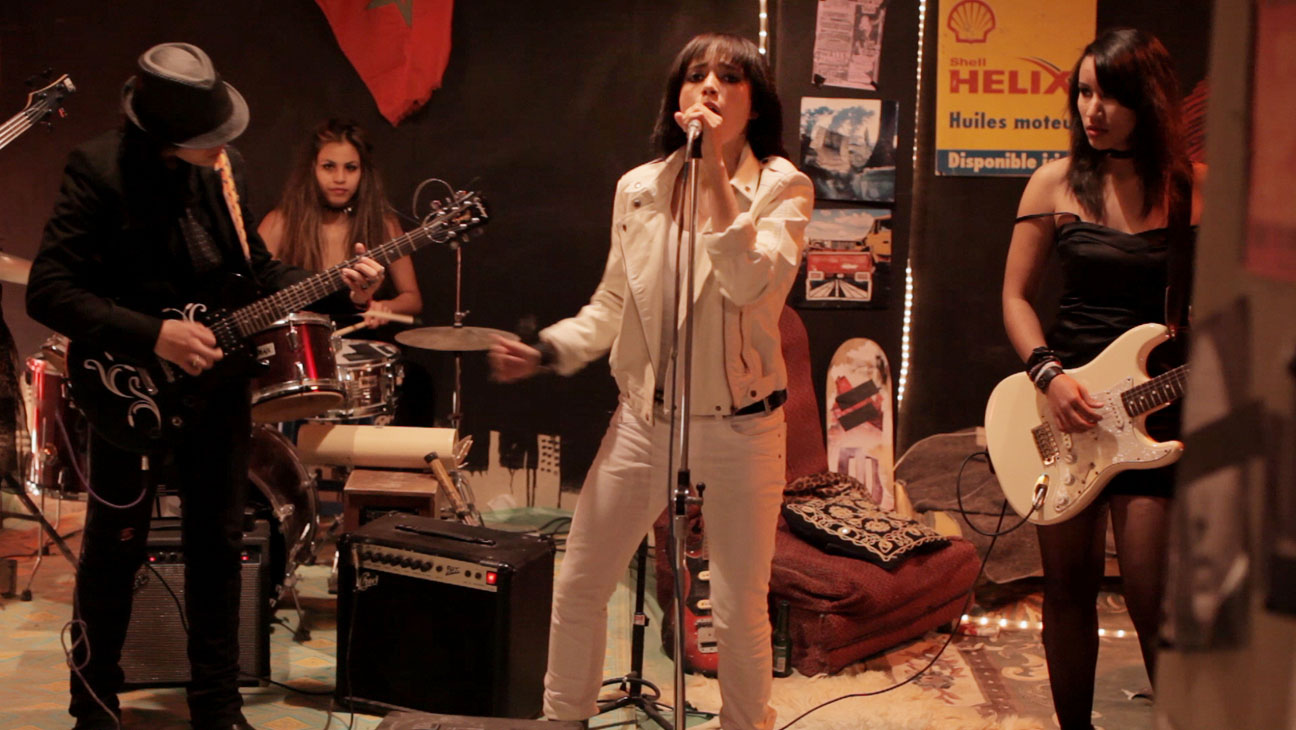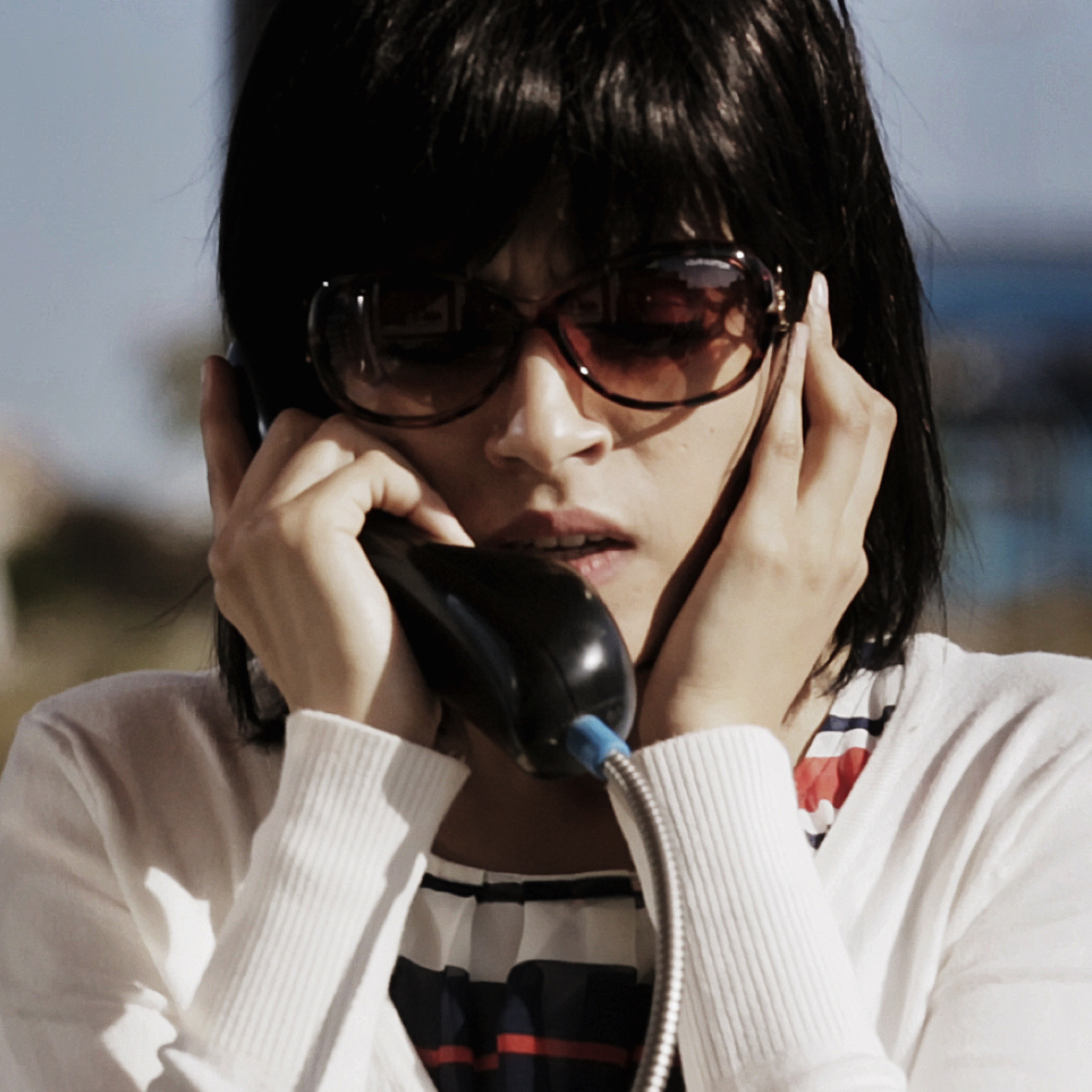What a country - sun, sea, and sand, and all of us burning to get out …
Norah, get into it … punk rock, OK? Don’t let it drag. Are you ready? Sarah, Bonnie, Basma? Let’s go: un, deux, et trois!
Sultry, twenty-something Malika trawls the grimy side streets of Tangier in skinny jeans and sticky, frayed Converse faintly reeking of stale lager, eyeing from beneath the shadow cast by a flurry of jet black bangs the dead-end world before her … Think Siouxsie Sioux and Johnny Thunders, guitars in tow, meet Hindi Zahra in the burned-out basement of a seedy Moroccan haunt; our girl is one part woman, two parts rebel, and five parts pure, unfiltered rock and roll, working at a French call centre by day and kicking out the jams by night, stuck between Maroc and a hard place. What a country – sun, sea, and sand, and all of us burning to get out, she lets rip into a hot microphone clutched by a set of sweaty fingers and dirty nails, as the band drives forth to a lugging, primordial rhythm and the studs of her white faux-leather biker jacket gleam beneath a sole bulb dangling from the ceiling. IIIIIIII’m so boooooored with Mo-ro-cco – but what can I dooooo!?
With little going for Malika, who lives at home with her kid sister, her mother, and her all-but absent father, rock and roll is not just music, but a solace, a refuge, a hope, and - perhaps above all - an escape. Working at a call centre where she’s the subject of casual racism is anything but ideal, and even less so, having to work as a jack-of-all trades mechanic in the garage of a father who wants more than anything to get her off his greasy hands; but, as he laments, ‘who wants to marry a girl who wears jeans, with dirty fingernails?’ Not even a butcher. Hard-headed, strong-willed, and defiant, she fancies none of the above, though her dream of making it big with her ragtag troupe, Traitors (sans ‘the’) seems to be sinking far beyond the glowing Maghrebi horizon with each passing day.
This atmosphere of hopelessness soon dissipates when a record executive from faraway London expresses an interest in Malika’s band, although her proposition turns out to be less favourable than it initially appeared. The catch? In order to have their record produced, the gang has to scrape together enough dirhams to rent a studio for as long as it takes to record a demo. Barely managing to survive, and without even a stint at the call centre, finding the dough isn’t going to be easy; but then again, nothing in Malika’s life ever has been, and if she’s not going to escape from a world of corrupt politicians, nouveau-riche boys – ‘just a bunch of fucking hoods’, as she calls them – in sports cars, and an endless labyrinth of dead-end streets, she’s going to die trying. Queue boot-strapping, guitar-slinging, politically-charged diatribes, and the setting of all amplifiers to 11; Maroc and roll, baby.

Going through the barrage of films due to be screened at last year’s Dubai International Film Festival, Traitors – with a bold, scribbled star beside it – was on the top of my ‘to see’ list. Directed and co-produced by American filmmaker Sean Gullette (in association with Karim Debbagh and Audrey Rosenberg), and financed by Hoor Al Qasimi’s Sharjah Art Foundation, it represents a divine union of Eastern moods and sensibilities with punk rock vibes and aesthetics; or, in other words, more or less the sort of marriage I envisioned when I first founded this publication a couple years back, and which has constituted the basis of much of my writing. With a fast-paced storyline, a Moroccan setting, a cast of alluring and unpredictable characters that could have come straight from the frames of a comic book, and a throbbing, original soundtrack, Traitors is a veritable feast for the senses – a fact which Gullette is not shy to make note of. ‘To state the obvious … please watch [it] in the dark, on a big screen, without interruption, and with the sound quite loud!’ he told me, prior to viewing the film; and, following the instructions on the tin, I cracked open a bottle of bubbly brew (sadly there were no Casablancas on hand), turned the lights down low, tuned the dials on my stereo towards normally-unexplored territory, and slipped beneath the floral Persian patterns of my bedspread to make for the shores of Morocco.
Think Siouxsie Sioux and Johnny Thunders, guitars in tow, meet Hindi Zahra in the burned-out basement of a seedy Moroccan haunt; our girl is one part woman, two parts rebel, and five parts pure, unfiltered rock and roll
On the outset, Gullette’s film appears to be one centred around the power and allure of rock music, particularly in a North African context; however, as it progresses, it also comes to provide a powerful social commentary on the current generation of Morocco’s youth and their hopes, aspirations, frustrations, dilemmas, and anxieties, evoking at times a mood similar to that prevalent in earlier films such as Fatih Akin’s Head On, Bahman Ghobadi’s No One Knows About Persian Cats, and more recently – sans rock and roll, albeit – Hicham Lasri’s They are the Dogs, also set in Morocco. Cop stops you at a roadblock, takes all your papers away, belts Malika in the film’s frenetic opener; give him licence [and] registration – want ‘em back? Now you gotta pay. Here, there’s no room for censorship, subtlety, or modesty; the harangue goes on, sparing nothing and no one: son of a general speeding drunk in his Porsche Cayenne / hit a farmer on the highway – push the speed, two hundred and ten!
As bleak as the picture of Moroccan society painted by Traitors may be, though, the film is not without its powerful messages of hope, compassion, and optimism. A drug kingpin pines for his departed sweetheart, the human side of prostitution is brilliantly portrayed in a cinematic twist, and a coke-snorting hashish dealer is shown not as a mere tool or a failure of society, but rather as a human being with emotions, feelings, and aspirations, confined by her circumstances; and, despite her trying situation and the limits to which she is pushed, Malika never once loses sight of her dreams and ideals, and even risks everything at one point to help a friend in straits even more dire than hers. Traitors is also laudable in its celebration of the defiance of norms, traditions, and values, as well as externally imposed conditions in the pursuit of freedom and happiness; whether one’s salvation lies in rock and roll, fleeing to faraway lands, or elsewhere is besides the point. ‘My mother always said, “if you are a nail, endure the knocking”’, says a friend to Malika in a moment of crisis. ‘That’s only half of the proverb’, comes the reply; ‘the other half says: if you are a hammer, strike’ …

